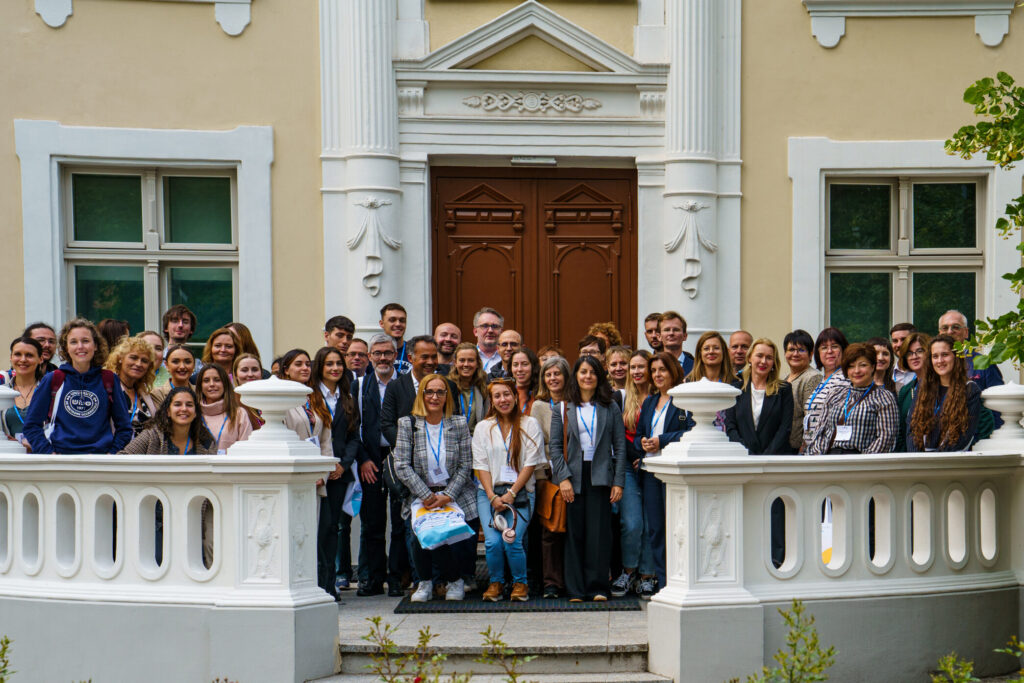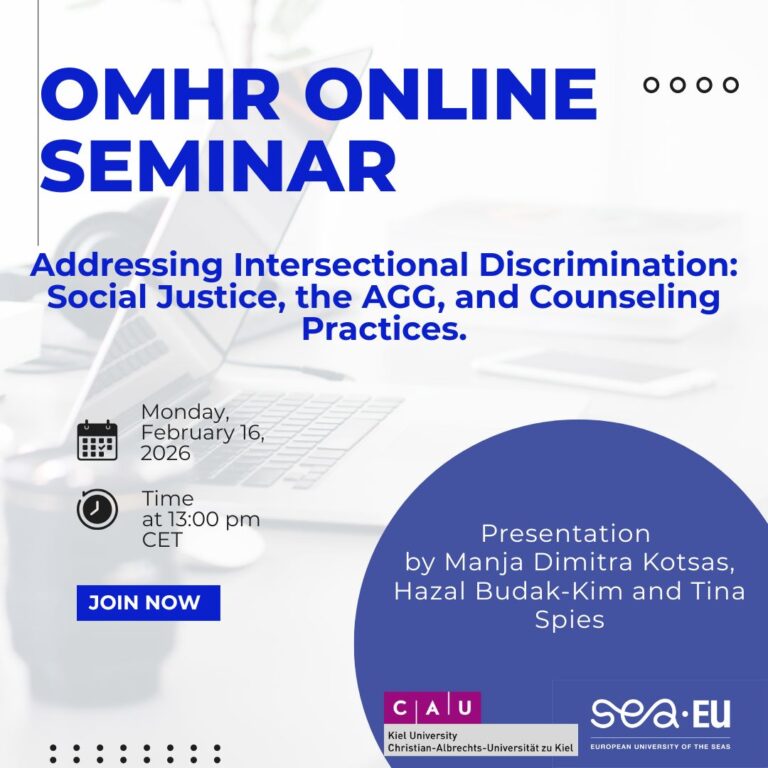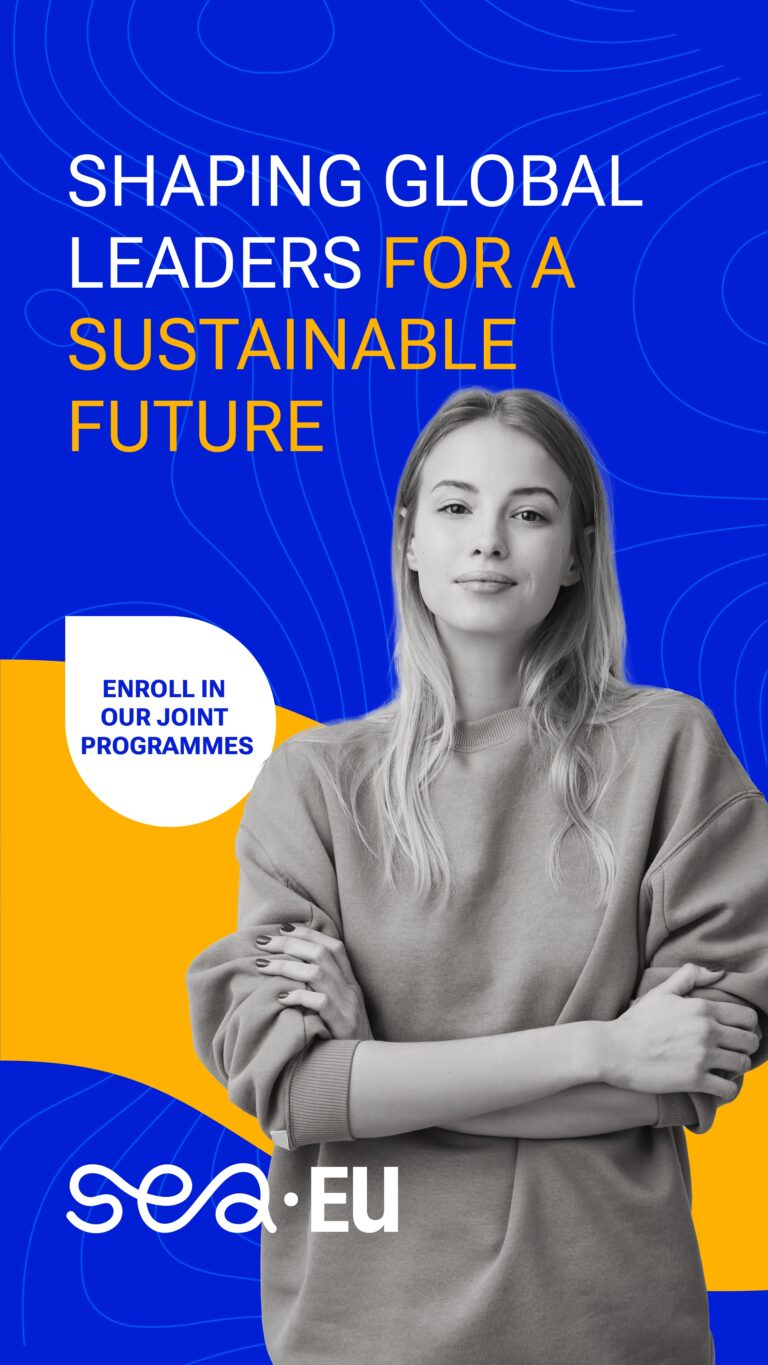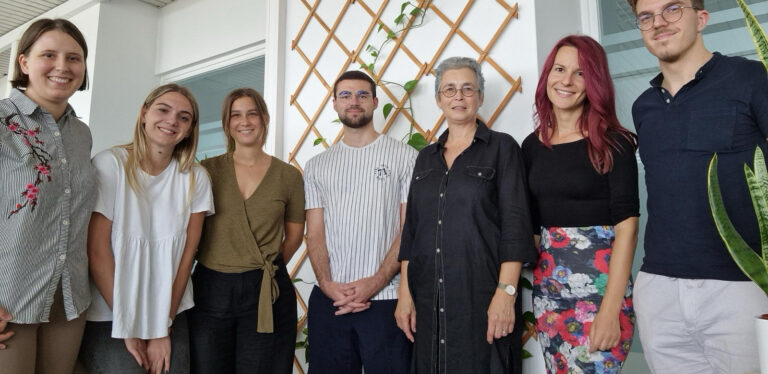Nearly 80 guests, including more than 50 from abroad, 9 universities, 20 scientific posters, 2 days of exchanging good practices and experiences. This is how the meeting “We strengthen the network of cooperation“, held on 6-7 June 2024, can be described in a nutshell. The University of Gdansk hosted partners from coastal universities affiliated to the SEA-EU alliance within the framework of Task 4.4 SEA-EU Goes Greener.

The aim of Task 4.4 is to support partner universities in their efforts towards Agenda 2030. Representatives of nine coastal universities working on sustainability on a daily basis are collaborating in the established SEA-EU 2.0 Sustainability Network promoting green practices at different levels of university organisation and management. One of the outcomes of the team’s work will be the development of a Green Charter, a code of good practice for academics as well as institutions related to the Alliance’s activities.
The event, organised by the leader of Task 4.4, took place at the Oliwa campus of the University of Gdansk: the Faculty of Social Sciences UG and the Faculty of Philology UG. The workshop part was organised at the Spa House (Hevelianum) in Brzeźno.
The special guests of the meeting were the Rector’s College from the Ilya Mechnikov Odessa National University in Ukraine, headed by the Rector of the university, Prof. Vyacheslav Truba, with whom the University of Gdansk is implementing a cooperation agreement and supporting the admission of the partner university into the SEA EU alliance.
The first part was open to all members of the UG community interested in the topics of the event. The meeting was chaired by Monika Adamczuk, Director of the UG Cooperation and Development Office. The guests were solemnly welcomed by the Rector of UG Prof. Piotr Stepnowski.
“Green transformation is our common direction. Sustainable development is part of the Strategy of the University of Gdansk. We are proud of the fact that the University of Gdansk is ranked very high in rankings taking into account actions towards the SDGs, and it is within the walls of our University that you will today discuss good practices towards implementing the idea of sustainable development,” emphasised Prof. Piotr Stepnowski.
Dr hab. Sylwia Mrozowska, Prof. UG, Coordinator of Task 4.4 SEA-EU Goes Greener, also spoke.
“The Goes Greener team was given three ambitious tasks to complete. The first is to build a network of people committed to sustainability in our universities. The second goal is to implement small steps towards a green transformation of the university. The third goal is to develop a ‘Green Chart’ – a charter that will cover not only our good practices, but also the development, formulation and agreement of our ambitions towards building a sustainable SEA-EU campus. We have two intense days ahead of us. I hope that our meeting will be further proof that it is worth building open platforms of cooperation,” announced Dr hab. Sylwia Mrozowska, prof. UG.
“We include gender in research” competition Gala
The first point of the conference was the award ceremony of the “We include gender in research” competition organised as part of the MINDtheGEPs project. Prof. Ewa Łojkowska, head of the MINDtheGEPs project on behalf of the UG, and Prof. Krzysztof Bielawski, Chairman of the Competition Committee, were invited to the stage. The ceremony was attended by the winners (Dominika Goik, Dr Adam Konopka, Patrycja Juchniewicz, Julia Wyrzykowska) and the runners-up (Marianna Mazur and Karolina Matusiak). Three prize-winners presented their works. Dominika Goik from the Intercollegiate Faculty of Biotechnology UG and GUMed presented a paper on ‘The effect of high-intensity interval training on the epithelium and immune system during pregnancy – proteomic analysis‘. The paper was prepared under the supervision of Dr hab. Paulina Czaplewska, Professor UG. Dr Adam Konopka from the Faculty of Philology, UG, presented his paper entitled. ‘Around birth regulation in the People’s Republic of Poland. An analysis based on a discursive-historical approach‘ under the supervision of Dr hab. Dorota Rancew-Sikora, Prof. UG. Dr Patrycja Juchniewicz from the Faculty of Biology UG presented a paper on “X chromosome inactivation in metabolic disorders and in healthy individuals”. The paper was written under the supervision of Dr hab. Joanna Jakóbkiewicz-Banecka, Prof. UG and assistant supervisor Dr Ewa Piotrowska.
Green transformation from a scientific perspective – Small steps presentation
An important highlight of the event was the presentation of the small steps towards the green transformation of higher education institutions. Nine universities affiliated to the SEA-EU alliance presented their steps towards making the campus a greener and more sustainable place. The partners presented their proposals for designing and implementing innovative projects to meet the challenges of Agenda 2030.
The first speaker was Yves Quere, deputy coordinator of Task 4.4 SEA-EU Goes Greener. The researcher from the University of Western Brittany in Brest presented the French university’s approach to innovation and sustainability. The French delegation planning to travel to Poland for the Goes Greener meeting chose rail transport, thus contributing to reducing their carbon footprint.
Professor Margarida Ribau Teixeira from the University of Algarve (Portugal) then took the floor. The environmental engineer presented the customs and good practices of the university located in the south of the Iberian Peninsula.
Professor Alessandro Sapio talked about Circular Spring at the University of Parthenope in Naples (Italy).
In turn, Mathilde Moe Strand from Nord University in Bodo (Norway) presented how Eco-Lighthouse certification works. This is a certification tool and environmental management system that aims to help companies reduce their environmental impact and promote green transformation.
Sustainability is not only about environmental and human rights issues. Helena Fechner told the participants what is being done in the field of culture for sustainable development at Christian Albrecht University in Kiel (Germany).
Another presentation was given by Prof. José Luis García Morales from the University of Cadiz (Spain). Among the good practices for the SDGs implemented by the Spanish University, the researcher mentioned the extensive activation of students, the inclusion of sustainability goals in the planning of student activities, as well as numerous research and scientific projects.
Good practices at the University of Split (Croatia) were presented by Prof Smiljana Pivčević. The university organises a number of workshops, seminars and conferences for the entire academic community and the socio-economic environment on science and education for sustainable development.
The implementation of Agenda 2030 at the University of Malta is coordinated by the Committee for Sustainable Development (C-Sum). Prof. David C. Magri, a member of the committee, talked about the main tasks facing this body. These include: overseeing the implementation of the SDGs as part of UM’s strategic plan, developing a sustainability vision and strategy for the university and identifying SDG areas, setting targets and indicators for subsequent monitoring.
Dr Krzysztof Szczepaniak, Director of the UG Centre for Sustainable Development, in a small steps presentation, talked about the implementation of the Green UG competition, the results of which were announced at the beginning of June. As part of the competition, mixed teams consisting of students and UG employees applied for funding for projects contributing to the development of the University of Gdansk’s green infrastructure. Implementation of the winning projects is scheduled for the coming year.
On sustainable development at the Kurhaus (Hevelianum)
In the afternoon, the meeting participants moved to the Kurhaus (Hevelianum) in Gdańsk-Brzeźno, which hosts educational workshops on sustainable development for Pomeranian youth on a daily basis. There, they took part in a workshop on developing the scope of the Green Charter, which is to constitute the commitment of the SEA-EU 2.0 European University to sustainable development. The workshop was led by Dr Magdalena Żadkowska.
The first day of the meeting was crowned by a gala dinner.
Poster session and lectures within the walls of Neophilology
The second day of the event was organised at the UG Faculty of Philology in the Neophilology building. As a warm-up, participants had the opportunity to play an interactive game to measure how much carbon footprint they produce per day.
The participants continued with a discussion and exchange of good practices on sustainability. Dr hab. Barbara Pawłowska, Prof. UG (Faculty of Economics UG), Dr hab. Beata Grobelna, Prof. UG (Faculty of Chemistry UG), Dr Magdalena Markiewicz (Faculty of Economics) and Dr hab. Artur Giełdoń, Prof. UG (Faculty of Chemistry UG) talked about the cyclical organisation of the Sustainable Development Day at the University of Gdańsk. The aim of the event is to promote, support the idea and realisation of the goals of sustainable development by initiating projects that promote the application of the principles of sustainable development in all areas of social life and economic activity. The event is aimed at young people of school age and is organised by staff and students of UG.
In the Faculty of Philology, as part of the strengthening of the SDG network between researchers from partner universities, a space was organised for a poster session presenting the results of research carried out under the Small Grants Programme “UGrants”, which received additional funding due to their connection with sustainable development goals. An introductory word was given by Dr Joanna Morawska, Coordinator of Task 2.2 SEA EU “Fostering inclusive, digital and green interdisciplinary and innovative training pathways”. During the poster session, research results and good practices of representatives from partner universities were also presented. A total of 20 posters were presented.
The official part of the SEA-EU Goes Greener meeting was crowned by the speech ‘ESG Reporting in Higher Education Institution’s’ by Aleksandra Pepłowska from Deloitte. As she highlighted, by committing to ESG standards and regulations, higher education institutions can not only increase funding for sustainable transformation, but also contribute to building a more sustainable and fairer world.
Participants interested in preparing future project proposals had the opportunity to meet in a smaller group during the ‘Future projects’ workshop. An overview of the current European Commission (Horizon Europe) competitions on the SDGs was presented and delivered by Tomasz Łapian (Office of Strategic Projects and Rector Initiatives).
At the very end of the event, interested participants had the opportunity to explore Gdansk’s Old Town during a guided walking tour.
aut. Szymon Gronowski



